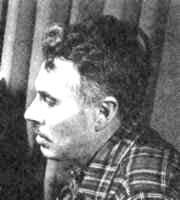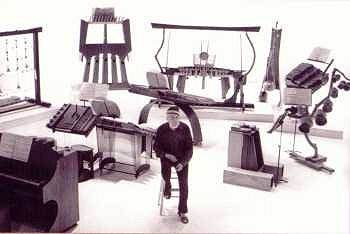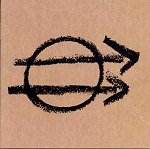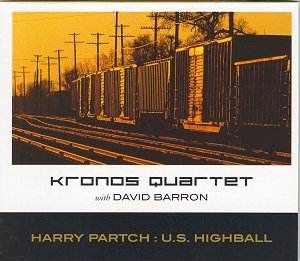 Partch in 1946
Partch in 1946
I have an admission
to make: I have already seen a review
of this CD in a prominent British magazine.
Mind you, it’s not likely to influence
my opinion, because the reviewer somehow
contrived to come to a very curious
conclusion. He maintained that the Kronos,
who have been coupling US Highball
with Steve Reich’s Different Trains
in their concerts, have thereby "[revealed]
Partch as more clearly of the American
musical tradition, rather than always
the odd man out". I was shocked,
I can tell you, but nowhere near as
much as Harry Partch would have been!
Why?
It’s a very interesting
story. The answer is buried in those
innocent-looking italics. Partch relates
to the "American musical tradition"
- or any other Western European-based
musical tradition - in much the same
way as a human hand to a hot brick.
Indeed, the whole point about Partch
is that he made a somewhat drastic move
of washing his hands of the entire shooting-match,
a move he consolidated by consigning
all the music he had already written
to the tender mercies of a pot-bellied
stove.
What was the source
of his dissatisfaction? Everything!
Performing practices and traditions,
the cult of the virtuoso, musical theory
and education, the role of music, the
subservience of words to music - you
name it and Partch was "aginn"
it. It seems that, most of all, he despised
the mystique that had been built, like
an ivory tower, around the hallowed
feet of Music-with-a-capital-M. This
growing unease was further fuelled by
his discovery of a book, not - as you
might expect - about music, but about
physics. From the learned pages of Helmholtz’s
On the Sensation of Tone emerged
Partch’s realisation that the 12-tone
equal-tempered scale, the very foundation
upon which the fabric of modern Western
musical culture was based, was rotten
to the core.
That must have come
as a bit of a blow. Armed with that
revelation, it didn’t take him long
to crystallise the reasons behind his
growing disquiet. For example, of all
the arts, music was the only one whose
practitioners and theoreticians not
only never questioned or explored the
science of their art. On the contrary
musicians, and even musicologists, at
best considered such things beneath
them, or at worst regarded such activities
as somehow heretical That pot-bellied
stove became the symbol of a decision
which had truly staggering implications,
and set him on a path of almost unimaginable
difficulty: Partch’s only options were
either to forget music altogether, or
to create from scratch an entire "Music"
of his own - research, develop and document
the theoretical foundation, design notations,
compose, build instruments, teach himself
and then others to play them, organise
and engage in performance, and make
his own recordings.

Partch with his personally
designed instruments
The basis of his musical
fabric was Monophony, just intonation
on a scale of 43 tones to the "octave"
- most definitely not an arbitrary
choice. His philosophy was that of Corporeality,
a term that’s hard to define precisely,
but has to do with music being an integral
part of a physical, inclusive
dramatic experience. In fact, Partch
observed, somewhat wryly, that the nearest
anyone had previously approached this
ideal was, of all people, Wagner. However,
having got the philosophy right, Wagner,
roughly speaking, completely "blew
it" in the implementation phase.
In Partch’s view, Wagner effectively
strangled his real achievement - the
nascent corporeality - at birth, through
grandiose over-inflation and a grossly
reverential approach to performance.
The magnitude of Partch’s
real achievement, though, is matched
only by the magnitude of the general
music-loving public’s ignorance of it.
Just try it on a friend - I can almost
guarantee the answer: "Hang on
- Harry who?" Bear in mind
that I haven’t even scratched at questions
like "what is ‘just intonation’?"
and "what are its implications?"
For the answers to these and others
you will have to wait for my forthcoming
MusicWeb article on Harry Partch.
If you are too fired
by curiosity to hang around while I
get my act together, try searching the
web, or getting hold of one or both
of two bits of essential book-reading.
Partch’s own Genesis of a Music
(Da Capo Press, New York, ISBN 0-306-80106)
is a comprehensive account of virtually
all aspects of his life’s work, and
in fact part of his life’s work!
It’s both mind-bending and (in parts)
mind-bendingly hard going, but well
worth the effort. Rather less effort
is required for Bob Gilmore’s eminently
readable, involving, and occasionally
heart-breaking Harry Partch - A Biography
(Yale University Press, ISBN 0-300-06521-3).
If you don’t believe
in miracles, or even if you do, you
must read Gilmore’s book. The story
that unfolds is of a life of continual
struggle. Committed to chasing what
any sane person would consider an impossible
dream, Partch faced more setbacks than
anyone should have to endure in ten
lifetimes. Yet, against all the odds,
Partch achieved his goal - a Twentieth
Century miracle to rival anything in
history or legend. By any reasonable
standards, this should have secured
Partch a place of honour in the annals
of musical history. Instead, Partch
is still unknown to all but a comparative
handful. Again, why?
Well, Partch remains
obscure precisely because his
music is entirely his own, separated
by its intonational incompatibility
from the rest of the world of music.
He had to invent his own instruments
because existing instruments couldn’t
play the notes he wanted them to play.
Well aware of the implications, he resigned
himself to the expectation that his
instruments and music would die with
him. I think he would have been so proud
of the efforts of his "disciples",
stalwarts like Dean Drummond and Newband
who have moved mountains to not only
preserve his precious creations, but
actually take them out into the world
put them to their intended use. Seeing
and hearing Newband play Partch’s own
music on Partch’s own instruments at
the 1998 Huddersfield Contemporary Music
Festival is something that I won’t forget
in a hurry, I can tell you! One swallow
doesn’t make a summer, though. To escape
obscurity, Partch needs wider advocacy.
The wholesale reproduction of the instruments,
allied to the training of legions of
players, just isn’t going to happen
- not even to publicise a miracle.
There may be no major
inroad, but there is a little alleyway.
Certain widely-used conventional instruments
are capable, without modification,
of inhabiting Partch’s justly-intoned,
microtonal world. Think of instruments
of continuously variable pitch, instruments
which are not "locked" onto
12-tone equal temperament - instruments
like the trombone, the human voice,
and the violin family. The two latter
in particular often perform untrammelled
by the presence of "fixed-pitch"
instruments. On such occasions, because
the ear alone dictates the intonation,
we actually hear justly-intoned music!
So, to play a melody by Partch, all
you need in addition is the ability
to find the 43 tones. It goes without
saying that that is a wee bit
harder than merely perceiving them -
even Harry Partch had to use lots of
small studs to "mark the spots"
on instruments like his Adapted Guitar
and Adapted Viola!
I said "violin
family" and "human voice",
didn’t I? Enter the Kronos Quartet,
stage left, and David Barron, stage
right, with arranger Ben Johnston hovering
in the wings! Let’s face it: at this
juncture we can hardly expect conventional
musicians to just "pick up Partch"
as if he were a morning paper. However,
the musicians of the Kronos, who have
built up a huge and enviable reputation
for musical derring-do, can hardly be
described as "conventional".
If anyone can "pick up Partch",
they can - provided, that is, someone
can first render Partch’s notation comprehensible.
As it happens, they’ve been this way
already, having previously recorded
arrangements of shorter pieces by Partch:
Barstow (on Nonesuch 79372) as
well as Two Studies on Ancient Greek
Scales (on Nonesuch 79457, also
on DVD, Arthaus Musik 100 050).
All of which brings
us to US Highball, the Kronos’s
first all-Partch disc, even if at around
29 minutes it is a "CD single".
Its text comes from jottings Partch
made in a little notebook as he worked
his way from California to Chicago late
in 1941. Why, in the midst of depression,
would he have done that? The penetratingly
perceptive booklet note by Bob Gilmore
explains the work and its provenance
in fascinating detail, but basically
Partch felt isolated, and having been
invited by someone interested in his
work, he set off almost on a whim: "[After]
more than six years of California depression,
I jumped at the chance of seeing some
Midwest depression."
Considering his journey
took only about a fortnight, Partch
assimilated the hobo subculture to a
remarkable degree, and expressed it
eloquently and - be warned! - idiomatically,
through both his words and his music.
Originally, Partch scored the music
for Adapted Guitar, so that he could
perform it himself, entirely independently.
A year or two later, having acquired
a couple of cohorts, he added Kithara
and Chromelodeon to the instrumentation.
Finally, in the mid-fifties he more
fully re-worked it, in the light of
his developing art, for a much larger
ensemble of nine instruments whose players
also shared the vocal line. Clearly,
Partch cared a lot for this work, which
he developed in these stages from a
simple personal expression to a more
universal statement about the good old
"human condition".
Johnston, a former
student - or should I say "cohort"?
- of Partch’s, based his arrangement
on the second version, whose scoring
is the most commensurate with the number
of "voices" available in the
target ensemble. It’s a bigger job than
conventional arrangement, not only because
of the need to translate the notation,
but also because the original instrumentation
is anything but conventional. There
is a "comfort" factor, because
most listeners will in any case have
no idea what the originals sound like.
I look forward to the day when that’s
not true any more!
Now the hard part.
The actual "review" has to
be pretty well perfunctory. When I think
about it, I’m somewhat short of common
reference points. It’s a bit like trying
to describe a three-dimensional cube
to a two-dimensional being! Let’s try
the mundane  approach
and see where it leads. Presentation:
admirable. The apt illustration adorns
an open slip-case, and the booklet cover
reproduces a hobo symbol meaning "Get
out fast!" [left].
The booklet itself is satisfyingly comprehensive.
In addition to Bob Gilmore’s valuable
essay, the full text is given along
with a handy glossary of hobo terms.
I did, however, notice a gap in the
text for the final track! The recording:
this is excellent, close-miked and clear
but nicely ambient. The players of the
quartet appear to be deployed in pairs
either side of the vocalist. The instrumental
performance: well up to the Kronos’s
usual standard, bristling with vitality
and alive to every twist and turn of
the music. The vocal performance: Barron
is superb, though it would be disingenuous
of me to say that it’s the best I’ve
heard since Partch’s own, because as
far as I’m aware there are no others!
Nevertheless Barron plays his part -
or I should say "parts" -
beautifully, slipping as Partch required
between singing and intoned speech to
project with real conviction the sarcasm
and bitterness, loneliness and danger,
sociability and excitement, seriousness
and silliness that Partch encompasses
in his words.
approach
and see where it leads. Presentation:
admirable. The apt illustration adorns
an open slip-case, and the booklet cover
reproduces a hobo symbol meaning "Get
out fast!" [left].
The booklet itself is satisfyingly comprehensive.
In addition to Bob Gilmore’s valuable
essay, the full text is given along
with a handy glossary of hobo terms.
I did, however, notice a gap in the
text for the final track! The recording:
this is excellent, close-miked and clear
but nicely ambient. The players of the
quartet appear to be deployed in pairs
either side of the vocalist. The instrumental
performance: well up to the Kronos’s
usual standard, bristling with vitality
and alive to every twist and turn of
the music. The vocal performance: Barron
is superb, though it would be disingenuous
of me to say that it’s the best I’ve
heard since Partch’s own, because as
far as I’m aware there are no others!
Nevertheless Barron plays his part -
or I should say "parts" -
beautifully, slipping as Partch required
between singing and intoned speech to
project with real conviction the sarcasm
and bitterness, loneliness and danger,
sociability and excitement, seriousness
and silliness that Partch encompasses
in his words.
Together, Barron and
the Kronos give an admirable impression
of Partch’s world of just-microtonality:
stepping outside the normal parameters
and conventions of "music as we
know it" must present a formidable
technical challenge, even if you have
done it before. I should mention one
thing for the benefit of someone trying
Partch for the first time: you’ll hear
a lot of glissandi and portamenti, which
might strike you as odd in music that
purports to be "microtonal"
and therefore ostensibly interested
in finely-resolved pitches. The short
answer is that Partch was also keen
on the expressive potential of the "curvature"
of sound.
Actually, it’s a shame
that this isn’t a DVD, because it sounds
like there’s a considerable visual element:
there’s a palpable feeling that US
Highball isn’t just being played
and "sung", it is being acted
out. As an introduction to a seminal
Partch work, it is exemplary.
However, I have misgivings
akin to those of Ben Johnston, as reported
in Gilmore’s writing. These have nothing
to do with the performances or recording,
which I commend unreservedly. They have
everything to do with the arrangement,
even though that itself strikes me as
a brilliantly-wrought translation of
Partch’s original. Like Johnston, in
spite of the great service to Partch’s
cause represented by this enterprise,
I do wonder whether it should have been
done at all.
We come full circle,
back to that reviewer I mentioned at
the outset. In the last paragraph of
his essay, Bob Gilmore refers to the
Kronos’s concert coupling of US Highball
with Different Trains, drawing
from the parallel the suggestion that
the Kronos love "recontextualising",
inviting us to "rethink established
meanings, and to make the known new
again." He was not, by any stretch
of the imagination, trying to suggest
that through Different Trains
we can "see" US Highball
and therefore Partch as "more clearly
of the American musical tradition".
This sort of spurious
conclusion can too easily be drawn,
given the present combination of factors.
Firstly, you cannot see the visual part
of Partch’s integrated philosophy at
work. Secondly, there is the very act
of arranging Partch’s music for conventional
instruments. Thirdly, your ear quickly
accustoms to the initially strange sounds
because, even though the music is microtonal,
it is also justly-intoned. There
is thus a very real danger of creating
an overall illusion of conventionality.
This point is important. Like Corporealism,
it’s also hard to express clearly, so
maybe I should draw you an analogy:
if you dress up a humanoid Martian in
a pin-stripe suit, folk are likely to
mistake it for an accountant! Make no
mistake, Partch is most definitely a
"Martian", no matter what
you dress him in!
Paul Serotsky
See also A
Just Cause by Paul
